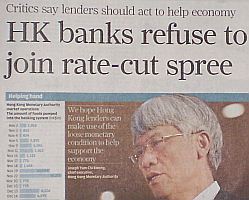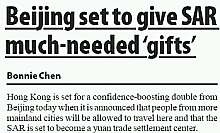14-20 December, 2008
As if to make up for the weakness of its dark brown, water-flavoured product, the IFC Mall branch of Pacific Coffee jolts Hong Kong’s white-collar salary-folk awake this sleepy Monday morning with Steppenwolf’s Born to be Wild. Over by the refrigerated display cabinet, wild American friend Odell is indulging in his latest hobby – pretending to peruse the ingredients labels on bottles of fruit juice while in fact spying on other customers checking their emails on the PCs. Several fascinating stories are unfolding day by day. “The guy getting divorced from his wife in Canada,” he runs up to tell me, “he’s letting her keep the dog. Or maybe they have a daughter called Ketchup.” He darts back to see how the backpacker begging her parents for money is getting on.
The unmistakable, slightly portly figure of my old friend Percy Ratbone suddenly swaggers up to me, clutching a cardboard cup, cursing his gout and expressing delight at seeing me for the first time in ages. Like most career managers at the Swine Group – Asia’s token WASP family-run conglomerate – he started going gray at the temples by his mid-20s and is set to have an all-white head of hair by the time he hits 50 in another year or two. Profit worries about the firm’s Cathay Pacific Airways subsidiary are only adding to the effect. “Still, it could be worse. At least we’re not Hong Kong Airlines.” He sips his skimmed, sugar-free, decaffeinated, low-calcium latte and grimaces. “Nasty little company.”
The Mainland-owned carrier is in the news for firing two pilots who tried to take off from a taxiway rather than a runway at Chek Lap Kok. Percy shows me the South China Morning Post’s report from yesterday, naming the pair as Captain Indra Santrianto and First Officer Diego Martin Chiadria and saying the company...
Some pilots claim the sacked crew have been replaced by less-experienced officers hired from overseas on lower salaries…
John Findlay, general secretary of the Hong Kong Aircrew Officers Association, said yesterday: “The number of highly qualified pilots who have been terminated for no apparently justifiable reason is alarming.”
“And,” I go on, “the expression ‘less-experienced officers’ means ‘swarthy, shifty types with names like Santrianto and Chiadria’, right?” A bigger grin.
The HKAOA, Percy reminds me, bitterly opposed Cathay Pacific’s decision to train and introduce some Hong Kong Chinese pilots back in the 1990s. “Must be one of the last bastions of white male supremacism east of Suez,” he laughs. “Or west of it.”
Odell comes over in a state of excitement. “She’s pregnant!” he hisses, before rushing back.
The Ratbone looks at me quizzically.
“That girl at the computer wearing the sort of hippy clothes,” I tell him, as the theme song from Easy Rider fades out. “Or maybe a dog in Calgary.”
Reading between the lines, the result of the Miss Asia Pageant seems to have been rigged to thwart Mainland viewers whose votes would have prevented the ugly guy in drag who ended up claiming the crown for Hong Kong from winning, but this had nothing to do with Ricky Wong’s resignation as CEO of ATV, which was connected with his offensive remarks about the station’s Communist propaganda-style news reporting, which prompted Mainland advertisers to walk, and in fact he hasn’t resigned. So that’s clear.
It is all pretty unremarkable at a time when weirdness stalks the world. In Mongkok, an invisible mystery perpetrator on a rooftop threw bottles of acid onto a crowded street. Following earlier examples in Albania, Rumania and remote places we’ve never heard of in China, the USA has fallen victim to a respectable-sounding investment fund offering too-good-to-be-true returns that turned out to be a massive pyramid scheme. And this month’s Thai Prime Minister was born in the country’s famously backward and impoverished Northeast. The UK’s, that is – namely Newcastle on Tyne, England.

This holds out the prospect of various changes for us. Less pressure on Big Lychee International’s two runways, where too many slots are taken up by relatively small aircraft. Fewer busloads of Taiwanese clogging up the streets when overnighting here or transiting overland to the Pearl River Delta. Less demand for scarce hotel space, thus better value for visitors and more opportunities for non-hotel owners to share in the tourist dollars. Fewer trucks carrying containers backwards and forwards between the border and the port, thus less pollution in the air. Even fewer excuses to build more freeways and bridges that deplete public revenues, and the possibility of transferring land away from cargo handling to more useful things, like decent, affordable homes. It’s a nightmare and a calamity, and we are doomed.
Wed, 17 Dec
The mood on the Mid-Levels Escalator this morning is one of jubilation, as the word gets around that residents’ favourite utility, Hongkong Electric, will slash everyone’s bills by an amazingly generous 5.9 percent as of 1 January. The monopoly will now be charging us only a third more than we would be paying for our power if we lived over on Kowloon-side – and if that barely noticeable little premium isn’t worth every penny, what is? Indeed, as several of my fellow commuters remark as we glide down the hill towards Central, this is tantamount to the company’s main owner Li Ka-shing paying us out of his own pocket to live here on the Island.
Much of the credit for this delightful seasonal gift must go to the word ‘protracted’. As in…
Senior Government officials, perhaps mindful of growing public impatience with the way their ineptitude seems to be stretching statistical probability, decided to put on a big show of pro-actively defending the interests of the consumer. The negotiations were protracted in that one side was desperate to be able to show some sort of success and petrified at the blasting it would otherwise receive from outraged citizens, while the other was determined to extract the plentiful pound of flesh to which the sole supplier of an essential commodity is so obviously entitled. The sort of ‘protracted’ that, after much grappling about numbers, comes to an exhausted halt one-hundredth of a point below 10.
Thus, our valiant bureaucrats managed to fight off 30 percent of HEC’s more visionary and sizable capital expenditure plans for 2009-13, notably for a surprisingly expensive wind farm off Sai Kung. Without which that far-flung corner of the New Territories will presumably be plunged into freezing darkness – but that is the sort of sacrifice people up there must make when investment is being cut in order to deliver savings to the inhabitants on Hong Kong-side.
So, after what seems like many years in which the tariff has gone up and up, we enjoy a 19 percent cut in electricity charges. What a pity that the struggle got so ‘protracted’ that no time was left to prevent HEC from partially offsetting this with an extra fuel charge – hence the net cut of 5.9 percent that we cheer today.


As a part-owner of HSBC and – as of yesterday – some half-price Standard Chartered shares courtesy of their rights issue, I can’t help but be slightly disappointed by banks’ diplomatic responses to these pleas for imprudence. “Small and medium enterprises can drop dead,” would be refreshing to hear. “The good thing about Hong Kong’s tiny apartments is that when you seal off the doors and burn charcoal, they fill up with carbon monoxide really quickly,” would concentrate minds. “Since when has Joseph Yam been paid HK$6 million a year to encourage banks to ruin their asset quality?” would be a good one.
It’s not as if lenders are turning anyone and everyone away. With interest rates this low, a businessman owning a monopoly supply of a vital commodity with a Government-guaranteed rate of return of 9.99 percent on capital expenditure would no doubt get a big hug and a kiss on both cheeks.
Which raises the question – what shall I do with the money I save from Hongkong Electric’s cut in prices? After giving the matter careful thought, I have decided to DHL the UK branch of the Hemlock clan a special treat for Christmas. Few countries manage to be so cold and yet have a temperature above freezing point, and they will be sitting there in the draughty chill of Stonegallows Hall, trying to sustain life with log fires, gas central heating, woolen underwear and mugs of hot tea. And as 2008 draws to a close, they will enjoy a warm feeling inside, having made their brew with my thoughtful gift – teabags with tags.
To the rest of the planet, there is no such thing as a teabag without a tag. But in the UK there is no other sort. A few worldly types in the know sneer with contempt at this convenience taken for granted by the rest of humanity, inexplicably seeing tags as slovenly – as if they were on a par with slip-on shoes or electric razors. Unnecessary. A decadent waste of paper. We didn’t beat the Nazis by throwing perfectly good string away. But most Brits, on being shown a sachet dangling before them on a thread as if by magic for the first time, are in awe. The look of wonderment on their faces is a joy to behold. Before long, they ask themselves, “Do you remember when we used to have to…”
That’s a question. How do they get teabags out?



“These guys haven’t seen big increases for a long time,” says Ian Robins, boss of Hong Kong commercial slum landlord Link REIT, giving the impression that tenants in public housing estates’ privatized shopping centres are panting with lust at the idea of paying higher rents after long years of deprivation in which they could do no more than toss the Government a monthly peppercorn. The fact is that for some stallholders – as with their tenement-dwelling customers – almost-free accommodation is central to their whole economic existence. After decades, it has become an entitlement, and attempts to take it away will cause the sort of deafening screeching officials don’t want to hear.
The fault lies with neither the real estate company nor the subsidized merchants, but with our leadership and the high land price policy to which it clings as a psychological prop. The Government, as sole freehold owner of land, keeps the supply of space artificially tight in order to raise indirect revenue. This leads to unaffordable housing, so to avoid mass homelessness, the state gives land away for public residential projects that end up sheltering close to half the population. Net result – an easy source of revenue balanced by a massive handout, plus serious economic distortions and inequity that wouldn’t have to be there otherwise.
To add some more warps to the twisted market and its by-now unfathomable hidden cross-subsidies under the surface, geniuses in former Chief Executive Tung Chee-hwa’s administration decided it would be trendy to privatize things, so world leaders would look at them admiringly and say they were as cool as Ronald Reagan and Margaret Thatcher had been in their time. So the sprawling network of crumbling mini-malls was sold to profit-hungry investors, which brings us to the state of things today, with the Link REIT attempting to force our full-time, professional disadvantaged underclass to migrate from artificially low to artificially high rents as they are exposed to the forces of a rigged market. During the worst recession since the Ice Age, etc, etc.
How can we compensate for the squeezing out of economic activity, jobs and opportunities over the years by the high land price policy? The obvious way to broaden the economic base is to let the people own and use their land, but in the Freest Economy in the Solar System this is impossible. Like the third-generation public housing tenants paying a few hundred HK bucks a month in rent while owning an apartment and BMW in Shenzhen, the bureaucrats and tycoons cannot even conceive of a different system. So the former civil servants running Hong Kong use the combined might of their creative and imaginative powers to think up something else.
On a brighter note, with the Big Boss and nearly everyone away until 2009, I can safely and officially declare this weekend open.
